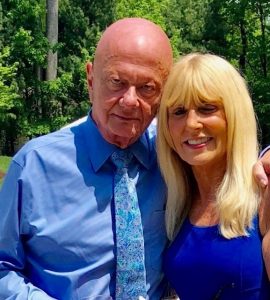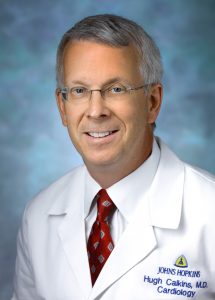Johns Hopkins clinician and researcher Hugh Calkins, MD, writes his cell phone number on the back of every business card he gives to patients after he completes a procedure. For someone who performs more than 300 cardiac procedures a year, that adds up to a lot of contacts.
“I really enjoy getting to know a patient, so if I do a procedure on you, we’re linked for life to some degree,” says Calkins, the Catherine Ellen Poindexter Professor of Cardiology and director of the Electrophysiology Laboratory and Arrhythmia Service in the Johns Hopkins Division of Cardiology.

And while Calkins may never meet with some patients again, there are others he’ll see for their lifetimes. Marvin Weiner is one of the latter, and he recently honored his near 30-year relationship with Calkins with an extraordinary $7.5 million dollar gift to endow a cardiac arrhythmia center in the Division of Cardiology. The funding will help Calkins and his colleagues propel research forward in arrhythmias (irregular heart rhythms), including supporting a new generation of cardiac electrophysiology (EP) specialists.
“Marvin’s gift is going to be unbelievably helpful in growing our research portfolio,” Calkins says. “It’s amazing.”
Weiner has supported Calkins and his team for a decade, giving back to benefit research fellows in EP, a subspecialty of cardiology that focuses on the electrical activity in the heart or how the heart beats. “He was providing a check every year to fund a research fellow — each of these individuals has gone on to pursue a career in cardiology. Marvin played a critical role in launching their careers,” Calkins says.
Specialists in EP are critical to the diagnosis and treatment of arrhythmias.
“We can think of the heart the way we think about a metronome in that it beats regularly. An arrhythmia is when something damages the metronome,” Calkins explains. “And it can either be in the heart’s upper chamber or lower chamber. It can be life-threatening or not. It can cause symptoms or not. Atrial fibrillation, which is the most common arrhythmia, increases stroke risk fivefold. There are many different types of heart rhythm conditions.”
Weiner was just 57 years old when he was diagnosed with a type of arrhythmia called atrial flutter, an extremely rapid beating of the atria due to a “short circuit” in the upper half of the heart. Calkins successfully performed a catheter ablation on him, a procedure that guides a thin electrode catheter into a patient’s heart to identify and then destroy the small area of the heart that was causing the arrhythmia.

Catheter ablation procedures are performed in a specialized cardiac catheterization laboratory called an EP lab, like the one Calkins directs at Johns Hopkins. The procedure, which Calkins helped pioneer in the late 1980s, has been the primary focus of his research and clinical career since that time. He has published more than 700 scientific articles and is an internationally recognized expert on cardiac arrhythmias and catheter ablation.
“Catheter ablation has now been demonstrated to be the best treatment option for most types of cardiac arrhythmias including atrial fibrillation, supraventricular tachycardia, and certain types of ventricular tachycardia,” Calkins says.
Despite this remarkable progress, more work still needs to be done to further improve the safety and efficacy of catheter ablation. Common arrhythmias like atrial fibrillation or Afib (rapid and irregular beats from the atria or upper chambers of the heart) increase the risk of stroke, dementia, heart failure, sudden death, and mortality and also impair quality of life.
Weiner’s philanthropy will help further research in and develop new treatment techniques not only for Afib but other types of arrhythmias as well.
Weiner is recently a retired successful businessman whose companies had, and continue to play, a major role in the food logistics and rail industries in North America. Over the nearly 30 years that Calkins has treated Weiner, a friendship developed.
“Basically, I just sort of got to know Marvin over time,” Calkins says. “He is clearly a gifted businessman, but he is also just a very kind, generous, and thoughtful person.”
Recently Weiner surprised Calkins with his decision not only to endow an arrhythmia center, but to recognize Calkins in the center’s name: The Hugh Calkins, Marvin H. Weiner, and Jacqueline J. Bernstein Arrhythmia Center also honors Weiner’s significant other, Jacqueline Bernstein. He hopes that his leadership gift will inspire others to give back in support of cardiovascular research.
For Calkins, the center’s naming symbolizes an enduring friendship and pays tribute to his more than three-decade career at Hopkins and other family connections to the institution. His grandfather, mother, sister, and nephew are all Johns Hopkins School of Medicine alumni, and his father trained in internal medicine at Hopkins.
“Having our names linked together is a powerful testimony to our friendship and allows us both to leave an enduring legacy at Hopkins,” Calkins says.
Editor’s Note: Marvin Weiner died on Sept. 6, 2023. Read more about his life.
Interested in supporting research and treatment for cardiac arrhythmias?
Topics: Faculty and Staff, Friends of Johns Hopkins Medicine, Johns Hopkins Medicine, Promote and Protect Health